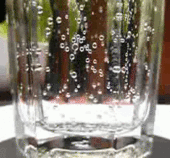Carbonation (beverage production)

Carbonization in the beverage industry is done by adding carbon dioxide (also carbon dioxide, CO 2 ). The reason is to increase the refreshing effect by stimulating the taste sensory cells when drinking.
While beer or sparkling wine produces carbon dioxide through fermentation, it is artificially added to lemonades or soda water / table water , sometimes using natural mineral water that already contains carbon dioxide . During carbonation, carbon dioxide is pressed into the liquid under high pressure, around 0.2% of which reacts with water to form carbonic acid, while the majority of it dissolves as a gas in the water.
As a food additive , carbon dioxide bears the designation E 290 and is one of the preservatives .
In private households, carbon dioxide from pressure cartridges is fed into the drink to be fizzed with drinking water bubblers.
See also
Web links
Individual evidence
- ↑ Ordinance amending food and tobacco law provisions ( BGBl. 2006 I p. 444 )